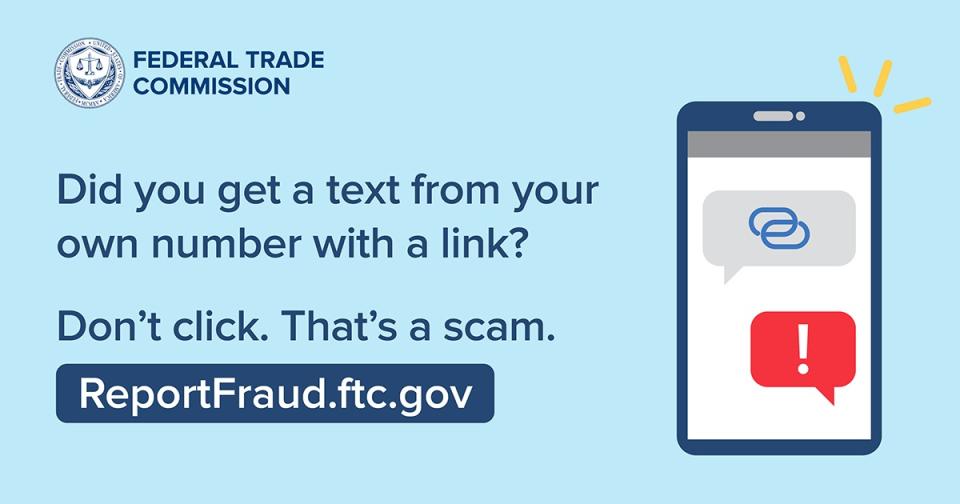Scammers are always thinking up ways to put a new spin on their criminal tricks. This time, they’re sending spam texts to you — from your own phone number. They’ve changed (spoofed) the caller ID to look like they’re messaging you from your number, but the shock of getting a text from yourself is bound to get your attention — which is what they’re after. If you get a text from your own number, it’s a scam.
How does the scam work? In one version, you’ll get a text thanking you for paying your bill with an offer to get a gift — just click on a link. Don’t click. Clicking could expose you to scams, download malware, or get your phone number added to lists that are then sold to other scammers.
Want to filter unwanted text messages or stop them before they reach you? Here are some options:
|
On your phone |
Your phone may have an option to filter and block spam or messages from unknown senders. Here’s how to filter and block messages on an iPhone and how to block a phone number on an Android phone. |
|
Through your wireless provider |
Your wireless provider may have a tool or service that lets you block calls and text messages. Check out ctia.org, a website from the wireless industry, to learn about options from different providers. |
|
With a call-blocking app |
Some call-blocking apps also let you block unwanted text messages. Go to ctia.org for a list of call-blocking apps for Android, BlackBerry, Apple, and Windows phones. You can also search for apps online. Check out the features, user ratings, and expert reviews. |
Did you get an unwanted text message? There are three ways to report it:
- Report it on the messaging app you use. Look for the option to report junk or spam.
- Copy the message and forward it to 7726 (SPAM).
- Report it to the Federal Trade Commission at ReportFraud.ftc.gov.


Can the FTC, or any other agency take action against scammers or fraudsters on the internet?
Thanks!
If they are spoofing a number - does blocking it do any good? They will just use another number. And blocking callers you don’t know is bad if your doctor is calling you back with test results, for example, since you don’t always know the number she is calling from.
i am constantly getting messages on my ipad that looks like it from a valid company asking me to fill a survey and I get a free IPhone or Ipad. the first or second time i thought they were legitimate. all i had to do is pay $2 for shipping. now i realize that all they wanted to get my credit card number. so ever since then i have been barraged with phoney charges on the two credit cards i used, never got an ipad or iphone. The credit cards take care of the charges but even when they cancel those cards and i get new ones, i still get charges i did not make.
i now respond to these offers with the word scam so hopefully they will stop.
In reply to i am constantly getting… by sharon Hitchcock
If you respond they probably know you're there or at least someone is; like with e-mail spam if you open one, it'll only bring you much more aw
This topic is very serious and not easy to resolve once it starts. I received a text from an unknown number stating "Congratulations your bill has been paid in full. Click on this link to claim your rewards." I deleted the text. The next day I received another one stating the same thing. I deleted the text. The next day I received another one stating the same thing THIS TIME WITH MANY "PEOPLE IN THIS CONVERSATION". I pulled the phone numbers in the "conversation" and was horrified as these numbers were unrecognizable and coast to coast. I went onto my online account with my cell phone provider and found over 70 PHONE NUMBERS attached to this original scam text. I immediately contacted the Fraud Unit and my cell phone provider was able to block the original text number, but it has taken many changes yet to be in effect to get rid of all of these "people in the conversation" that are using MY cell phone number to send texts and PICTURES! Very serious and troubling that even with scam blocking they were able to get through using TEXTS!
Thank you!! YOu all are awesome, thanks again for all your hard work!!
What do you suppose happens when you report a scam with your own phone number on it?
The Title of this article 'should' be, 'Steps the FTC Is Taking with Phone Companies to Eliminate SPAM Texting'.
- Followed by a 2nd article called, 'Steps the FTC Is Taking to Revitalize the 'Do Not Call' List & Make it Viable Again'.
- Everyone knows a SPAM Text-to-Self is fake; what we, the America People, need to know is what are the Fed Officials living off of Taxpayer Money doing to rectify & fix these things...AND provide your FTC/ FCC List of 'Successful Accomplishments' that you've did for the last decade-to-present time.
In reply to The Title of this article … by J.D.
You can read about cases going back to 2010, testimony, public events, press releases and other information about FTC activity related to the Do Not Call Registry and robocalls at ftc.gov/Robocalls.
Hi sir good suggestions for your response and thanking you.